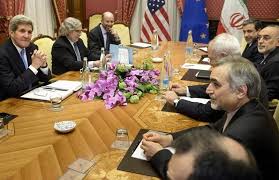 Nuclear talks between Iran and six world powers will pass the negotiators’ self-imposed Tuesday night deadline to produce the outline of an agreement and will be extended by at least a day, the United States said.
Nuclear talks between Iran and six world powers will pass the negotiators’ self-imposed Tuesday night deadline to produce the outline of an agreement and will be extended by at least a day, the United States said.
State Department spokeswoman Marie Harf said enough progress had been made to warrant an extension, although there still were “several difficult issues” to bridge. Secretary of State John Kerry who had planned to leave the talks on Tuesday will remain until Wednesday, she said.
Diplomats said China’s foreign minister had left the talks to return to Beijing and would be represented by his deputy. U.S. officials said they were prepared to continue to negotiate into Wednesday if it could lead to a framework accord.
An Iranian negotiator, meanwhile, said his team could stay “as long as necessary” to clear the remaining hurdles.
In Washington, White House press secretary Josh Earnest suggested that talks meant to produce an outline that would allow the sides to continue negotiations until the June 30 final deadline had not bridged all gaps. But he said that the sides were working to produce a text with few specifics, accompanied by documents outlining areas where further talks were needed.
“If it’s necessary — and, when I say if it’s necessary I mean if it’s midnight and a deal has not been reached but the conversations continue to be productive — we’ll be prepared to continue the talks into tomorrow,” he told reporters. “If we are making progress toward the finish line, than we should keep going.”
Officials said earlier Tuesday they hoped to wrap up the talks by the deadline with a joint general statement agreeing to start a new phase of negotiations to curb Iran’s nuclear program. That statement would be accompanied by more detailed documents that would include technical information on understandings of steps required on all sides to resolve outstanding concerns.
Those documents would allow the sides to claim that the new phase of talks is not simply a continuation of negotiations that have already been twice extended since an interim agreement between Iran and the so-called P5+1 nations — the United States, Britain, France, Germany, Russia and China — was concluded in November 2013.
President Barack Obama and other leaders have said they are not interested in a third extension.
After six-days of intense negotiations in the Swiss town of Lausanne, though, obstacles remained on uranium enrichment, where stockpiles of enriched uranium should be stored, limits on Iran’s nuclear research and development and the timing and scope of sanctions among other issues, according to negotiators.
If the parties agree only to a broad framework that leaves key details unresolved, Obama can expect stiff opposition from members of Congress who want to move forward with new Iran sanctions legislation. Lawmakers had agreed to hold off on such a measure through March while the parties negotiated.
In Israel, Prime Minister Benjamin Netanyahu renewed his severe criticism of the unfolding deal, saying it would leave intact much of Iran’s nuclear infrastructure, including underground research facilities, a plutonium reactor and advanced centrifuges capable of enriching uranium.
The U.S. says any final deal will stretch the time Iran would need to make a nuclear weapon from several months to a year. But Netanyahu said Washington initially promised “years” to a breakout time.
“In our estimate, it will be reduced to perhaps a year, most likely much less than that,” he said.
The softening of the language from a framework “agreement” to a framework “understanding” appeared due in part to opposition to a two-stage agreement from Iran’s supreme leader, Ayatollah Ali Khamenei. Earlier this year, he demanded only one deal that nails down specifics and does not permit the other side to “make things difficult” by giving it wiggle room on interpretations.
Russian Foreign Minister Sergey Lavrov, who had left Lausanne on Monday, returned to the talks on Tuesday, saying that he believed prospects for an agreement were “good.”
Kerry and others, including Iranian Foreign Minister Mohammad Javad Zarif have said the sides have made some progress. Other officials have said Iran is considering demands for further cuts to its uranium enrichment program but pushing back on how long it must limit technology it could use to make atomic arms.
Officials in Lausanne said the sides were advancing on limits to aspects of Iran’s program to enrich uranium, which can be used to make the core of a nuclear warhead.
Uranium enrichment has been the chief concern for more than a decade. But Western officials say the main obstacles to a deal are no longer enrichment-related.
Tehran says it wants to enrich only for energy, science, industry and medicine. But many countries fear Iran could use the technology to make weapons-grade uranium.
Associated Press/ My Way

Leave a Reply
You must be logged in to post a comment.